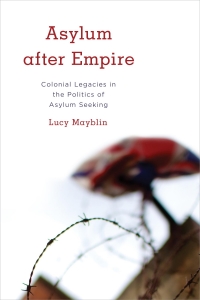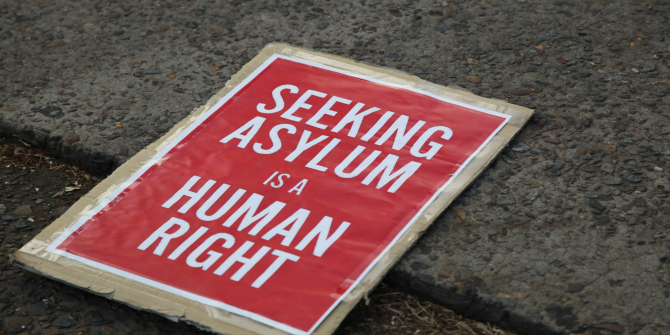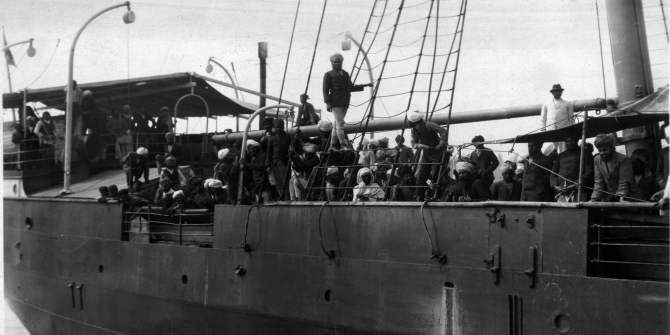In Asylum After Empire: Colonial Legacies in the Politics of Asylum Seeking, Lucy Mayblin considers the contemporary hostility of the British state towards asylum seekers in the context of colonial histories. While raising some questions about the limitations imposed by the book’s analytic framework, this is nonetheless a compelling study that will be an invaluable addition to activist-scholarship on forced migration, writes Chris Moreh.
Asylum after Empire: Colonial Legacies in the Politics of Asylum Seeking. Lucy Mayblin. Rowman and Littlefield. 2017.
 That the explanatory frameworks of the burgeoning interdisciplinary field of ‘refugee studies’ have yet to incorporate a historical analysis of colonialism and identify its lingering power structures and ideational legacies in our postcolonial present will strike some future readers of Asylum after Empire as counterintuitive. Yet, this assessment is well argued by Lucy Mayblin and is the foundational point of the book. In order to rectify this shortcoming, Mayblin proposes her monograph as ‘an effort at reading the contemporary hostility of the British state to postcolonial asylum seekers as dehumanisation within the context of colonial histories and in dialogue with the work of theorists from postcolonial and decolonial studies’ (12).
That the explanatory frameworks of the burgeoning interdisciplinary field of ‘refugee studies’ have yet to incorporate a historical analysis of colonialism and identify its lingering power structures and ideational legacies in our postcolonial present will strike some future readers of Asylum after Empire as counterintuitive. Yet, this assessment is well argued by Lucy Mayblin and is the foundational point of the book. In order to rectify this shortcoming, Mayblin proposes her monograph as ‘an effort at reading the contemporary hostility of the British state to postcolonial asylum seekers as dehumanisation within the context of colonial histories and in dialogue with the work of theorists from postcolonial and decolonial studies’ (12).
As a first step, we are presented with an overview of British asylum policies dating back to the 1707 Act of Union – that is, when ‘the British state came into existence’ (14) – and of what the author calls ‘the standard narrative’ in academic analyses of the phenomenon (Chapter Two). The latter, it is proposed, uncritically approaches the question of asylum as a ‘problem’, due to an ahistorical assumption that contemporary refugee movements are radically different from their previous manifestations, both in size and constitution. At the same time, careful sociological investigations exploiting the explanatory potential of ‘racism’ are also deemed unsatisfactory. ‘Hostility to asylum seekers is not straightforwardly racism’, Mayblin states, ‘but it does have its origins in the same regimes of differential humanity which have marked anti-black racism, Islamophobia and other such phenomena’ (179). They are all ‘a feature of the coloniality of power’.
Asylum After Empire sets out an alternative analytical approach reliant on problematising a fundamental tenet of ‘modernity’: the supposed universality of the concept of ‘man’, the origin of the rights-bearing subject of the contemporary normative framework of human rights. Extending Desmond King and Rogers Smith’s analysis of ‘racial institutional orders’ in American historical development to the British case through a focus on ‘coloniality/modernity’, the empirical chapters examine diachronically three ‘critical junctures’ that trace the historical development and legal embedding of ideas of ‘differential humanity’.
The adequately selected historical case studies explore, in turn, early-nineteenth-century debates over the abolition of slavery (Chapter Four); the failed Japanese proposition during the 1919 establishment of the League of Nations that a race equality clause be introduced in the organisation’s charter (Chapter Five); and the argumentative strategies through which Britain sought to exclude colonial subjects from the remit of the 1951 UN Geneva Convention on the Status of Refugees (Chapter Six). In relation to each case, the same two opposing ‘institutional orders’ are identified: the ‘colonial’ and the ‘transformative’. Through a careful examination of their discursive strategies, the author is able to successfully argue that a similar dialectic underlies contemporary British debates on asylum policy (with the ‘colonial’ now transmuted into the ‘anti-asylum institutional order’), as exemplified by the political arguments over the level of financial support to be provided to destitute asylum seekers (Chapter Seven).
The nonstandard narrative proposed by Mayblin is compelling, and the book draws its strength particularly from the analytic advantage of the colonial perspective over that of racism. As is convincingly argued, the careful deracialisation of contemporary political and policy discourse has left charges of racisms in explaining official attitudes towards asylum seekers easily dismissible on empirical grounds (152, 179).
A deeper understanding of the common roots of racial prejudice and a colonial mentality, and the transformation of their discursive manifestations over time, can therefore reinstate their critical explanatory power, the author argues. This is most strikingly evidenced through the contrast between the British delegations’ official arguments for resisting the extension of international human rights to colonised peoples during the negotiations of the Geneva Convention and the ‘behind-the-scenes’ employment of ‘the language of racial hierarchy and civilisation’ (127) in background efforts to circumvent ‘the danger posed by the UN, and particularly its human rights agenda, for British colonial interests’ (119). As such, far from being ‘an indulgent academic exercise’, the historical analysis is necessary for ‘making sense of the realities facing asylum seekers today’, and thus for effectively ‘critiquing the immediate impacts of policies and proposing alternative, more sympathetic and indeed human modes of responding to the existence of forced migrants in the world’ (178, emphasis in original).
The book’s empirical and analytical choices, nevertheless, do impose certain limitations. Empirically, while constraining the analysis to the ‘British state’ and British colonialism still allows the extension of the findings to other postcolonial contexts (6), a consideration of attitudes towards asylum seekers in countries that historically had not been colonial ‘administrative authorities’ would also induce a need to re-examine the core concept of ‘coloniality’, which in turn may reveal possibilities for very different interpretations and understandings of the ‘colonial’ episteme than the one proposed in the book.
Likewise, while the undertaken institutional and discursive-ideological analysis must restrict itself to exposing linkages between the rhetoric of ‘dehumanization’ and the politics of oppression, deeper engagement with the processes underlying the proclivity towards hierarchical thinking may require a transdisciplinary venture that goes beyond the ‘British state’ and its symbolic-structural violence to examine the broader civilising mechanisms through which the category ‘human’ was ethically constructed in Western pre-Enlightenment thought.
Such an undertaking, however, would potentially complicate the task of readily producing ‘sympathetic and indeed human’ responses to the pressing realties of forced migration. Most readers will therefore agree that, in our present political conjuncture, Asylum after Empire is an invaluable addition to the critical toolbox of activist-scholarship.
Note: This review gives the views of the author, and not the position of the LSE Review of Books blog, or of the London School of Economics.
Image Credit: (Kate Ausburn CC BY 2.0).









2 Comments